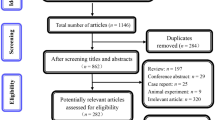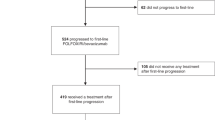Abstract
Objective
To assess the efficacy and safety of first-line standard chemotherapy plus bevacizumab in metastatic colorectal cancer and to explore how to optimize therapeutic efficacy.
Design
First, meta-analysis and pooled analysis of three randomized, controlled trials were used to compare response rate (RR), progression-free survival (PFS), overall survival (OS), and grade 3 or 4 adverse events (G3/4AEs) of chemotherapy plus bevacizumab (n=1169) with those of chemotherapy alone (n=1148).Second, using six different regimens plus bevacizumab, the Spearman method was used to analyze the correlationbetween these regimens and OS. Finally, one-way ANOVA was used to compare OS in these regimens.
Results
Overall, chemotherapy plus bevacizumab increased RR by 3.8%, prolonged PFS by 3.0 months and OS by 3.3 months, and increased G3/4AEs by 7.6%. Significant differences were found in PFS (hazard ratio [HR] = 0.65; p = 0.000), OS (HR = 0.79; p = 0.000), and G3/4AEs (risk ratio= 1.12; p = 0.006). However, no statistical difference was found in RR (odds ratio = 1.32; p = 0.17). The optimal regimens with regard to mean OS were capecitabine and irinotecan (CAPIRI) plus bevacizumab (24.00 months) and fluorouracil, leucovorin, and oxaliplatin (FOLFOX) plus bevacizumab (23.97 months).
Conclusion
First-line standard chemotherapy plus bevacizumab conferred a significant improvement in OS. In combination with bevacizumab, both CAPIRI and FOLFOX are favorable regimens, though further studies are needed to confirm these results.





Similar content being viewed by others
References
Weitz J, Koch M, Debus J, et al. Colorectal cancer. Lancet 2005 Jan 8–14; 365(9454): 153–65
Takayama T, Miyanishi K, Hayashi T, et al. Colorectal cancer: genetics of development and metastasis. J Gastroenterol 2006 Mar; 41: 185–92
Petrelli N, Douglass Jr HO, Herrera L, et al. The modulation of fluorouracil with leucovorin in metastatic colorectal carcinoma: a prospective randomized phase III trial. Gastrointestinal Tumor Study Group. J Clin Oncol 1989 Oct; 7: 1419–26
Poon MA, O'Connell MJ, Moertel CG, et al. Biochemical modulation of fluorouracil: evidence of significant improvement of survival and quality of life in patients with advanced colorectal carcinoma. J Clin Oncol 1989 Oct; 7: 1407–18
Piedbois P, Buyse M, Rustum Y, et al. Modulation of fluorouracil by leucovorin in patients with advanced colorectal cancer: evidence in terms of response rate. Advanced Colorectal Cancer Meta-Analysis Project. J Clin Oncol 1992 Jun; 10: 896–903
Goldberg RM, Sargent DJ, Morton RF, et al. A randomized controlled trial of fluorouracil plus leucovorin, irinotecan, and oxaliplatin combinations in patients with previously untreated metastatic colorectal cancer. J Clin Oncol 2004 Jun; 22: 23–30
Grothey A, Sargent D. Overall survival of patients with advanced colorectal cancer correlates with availability of fluorouracil, irinotecan, and oxaliplatin regardless of whether doublet or single-agent therapy is used first line. J Clin Oncol 2005 Dec 20; 23(36): 9441–2
Rosen LS. Inhibitors of the vascular endothelial growth factor receptor. Hematol Oncol Clin North Am 2002 Oct; 16(5): 1173–87
Hicklin DJ, Ellis LM. Role of the vascular endothelial growth factor pathway in tumor growth and angiogenesis. J Clin Oncol 2005 Feb 10; 23(5): 1011–27
Jain RK, Duda DG, Clark JW, et al. Lessons from phase III clinical trials on anti-VEGF therapy for cancer. Nat Clin Pract Oncol 2006 Jun; 3(1): 24–40
Giantonio BJ, Catalano PJ, Meropol NJ, et al. Bevacizumab in combination with oxaliplatin, fluorouracil, and leucovorin (FOLFOX4) for previously treated metastatic colorectal cancer: results from the Eastern Cooperative Oncology Group Study E3200. J Clin Oncol 2007 Apr 20; 25(12): 1539–44
Kabbinavar F, Hurwitz HI, Fehrenbacher L, et al. Phase II, randomized trial comparing bevacizumab plus fluorouracil (FU)/leucovorin (LV) with FU/LV alone in patients with metastatic colorectal cancer. J Clin Oncol 2003 Jun 1; 21(1): 60–5
Hurwitz H, Fehrenbacher L, Novotny W, et al. Bevacizumab plus irinotecan, fluorouracil, and leucovorin for metastatic colorectal cancer. N Engl J Med 2004 Jun 3; 350(23): 2335–42
Saltz L B, Clarke S, Diaz-Rubio E, et al. Bevacizumab in combination with oxaliplatin-based chemotherapy as first-line therapy in metastatic colorectal cancer: a randomized phase III study. J Clin Oncol 2008 Apr 20; 26(12): 2013–9
Hochster HS, Hart LL, Ramanathan RK, et al. Safety and efficacy of oxaliplatin and fluoropyrimidine regimens with or without bevacizumab as first-line treatment of metastatic colorectal cancer: results of the TREE study. J Clin Oncol 2008 Jul 20; 26(21): 3523–9
Moehler M, Sprinzl MF, Abdelfattah M, et al. Capecitabine and irinotecan with and without bevacizumab for advanced colorectal cancer patients. World J Gastroenterol 2009 Jun 28; 15(4): 449–56
Giantoni BJ, Levy DE, O'Dwyer PJ, et al. A phase II study of high-dose bevacizumab in combination with irinotecan, 5-fluorouracil, leucovorin, as initial therapy for advanced colorectal cancer: results from the Eastern Cooperative Oncology Group study E2200. Ann Oncol 2006 Sep; 17(9): 1399–403
Bir A, Tan W, Wilding GE, et al. 5-fluorouracil, leucovorin and oxaliplatin plus bevacizumab in the first-line treatment of metastatic colorectal cancer: a single-institute study. Oncology 2007; 72(1-2): 4–9
Sobrero A, Ackland S, Clarke S, et al. Phase IV study of bevacizumab in combination with infusional fluorouracil, leucovorin and irinotecan (FOLFIRI) in first-line metastatic colorectal cancer. Oncology 2009; 77(2): 113–9
Van Cutsem E, Rivera F, Berry S, et al. Safety and efficacy of first-line bevacizumab with FOLFOX, XELOX, FOLFIRI and fluoropyrimidines in metastatic colorectal cancer: the BEAT study. Ann Oncol 2009 Nov; 20(11): 1842–7
Grothey A, Sugrue MM, Purdie Dm, et al. Bevacizumab beyond first progression is associated with prolonged overall survival in metastatic colorectal cancer: results from a large observational cohort study (BRiTE). J Clin Oncol 2008 Nov 20; 26(33): 5326–34
Hurwitz HI, Fehrenbacher L, Hainsworth JD, et al. Bevacizumab in combination with fluorouracil and leucovorin: an active regimen for first-line metastatic colorectal cancer. J Clin Oncol 2005 May 20; 23(15): 3502–8
Scappaticci FA, Skillings JR, Holden SN, et al. Arterial thromboembolic events in patients with metastatic carcinoma treated with chemotherapy and bevacizumab. J Natl Cancer Inst 2007 Aug 15; 99(16): 1232–9
Nalluri SR, Chu D, Keresztes R, et al. Risk of venous thromboembolism with the angiogenesis inhibitor bevacizumab in cancer patients: a meta-analysis. JAMA 2008 Nov 19; 300(19): 2277–85
Rafailidis PI, Kakisi OK, Vardakas K, et al. Infectious complications of monoclonal antibodies used in cancer therapy: a systematic review of the evidence from randomized controlled trials. Cancer 2007 Jun 1; 109(11): 2182–9
Saif MW, Elfiky A, Salem RR. Gastrointestinal perforation due to bevacizumab in colorectal cancer. Ann Surg Oncol 2007 Jun; 14(6): 1860–9
Meyerhardt JA, Stuart K, Fuchs CS, et al. Phase II study of FOLFOX, bevacizumab and erlotinibas first-line therapy for patients with metastatic colorectal cancer. Ann Oncol 2007 Jul; 18(7): 1185–9
Tol J, Koopman M, Rodenburg CJ, et al. A randomised phase III study on capecitabine, oxaliplatin and bevacizumab with or without cetuximab in first-line advanced colorectal cancer, the CAIRO2 study of the Dutch Colorectal Cancer Group (DCCG). An interim analysis of toxicity. Ann Oncol 2008 Apr; 19(4): 734–8
Tol J, Koopman M, Cats A, et al. Chemotherapy, bevacizumab, and cetuximab in metastatic colorectal cancer. N Engl J Med 2009 Feb 5; 360: 563–72
Hecht JR, Mitchell E, Chidiac T, et al. A randomized phase IIIB trial of chemotherapy, bevacizumab, and panitumumab compared with chemotherapy and bevacizumab alone for metastatic colorectal cancer. J Clin Oncol 2009 Feb10; 27(5): 672–80
Kabbinavar FF, Schulz J, McCleod M, et al. Addition of bevacizumab to bolus fluorouracil and leucovorin in first-line metastatic colorectal cancer: results of a randomized phase II trial. J Clin Oncol 2005 Jun 1; 23(16): 3697–705
Cassidy J, Saltz LB, Giantonio BJ, et al. Effect of bevacizumab in older patients with metastatic colorectal cancer: pooled analysis of four randomized studies. J Cancer Res Clin Oncol 2010 May; 136(5): 737–43
Saltz LB, Lenz HJ, Kindler HL, et al. Randomized phase II trial of cetuximab, bevacizumab, and irinotecan compared with cetuximab and bevacizumab alone in irinotecan-refractory colorectal cancer: the BOND-2 study. J Clin Oncol 2007 Oct 10; 25(29): 4557–61
Acknowledgements
No sources of funding were used to conduct this study or prepare this manuscript. The authors have declared no conflicts of interest relevant to this work.
Author information
Authors and Affiliations
Corresponding author
Rights and permissions
About this article
Cite this article
Li, S., Dr Chi, P. Optimizing the Efficacy of First-Line Chemotherapy plus Bevacizumab in Metastatic Colorectal Cancer. BioDrugs 25, 43–50 (2011). https://doi.org/10.2165/11584680-000000000-00000
Published:
Issue Date:
DOI: https://doi.org/10.2165/11584680-000000000-00000




